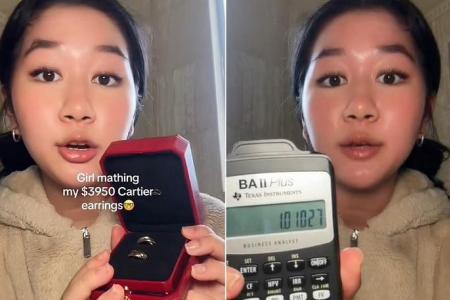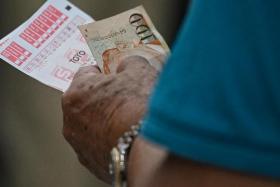‘These $3,950 earrings are practically free’: How ‘girl math’ is used to justify irrational spending
Ms Chloe Liem feels her $3,950 Cartier Trinity earrings are “practically free”.
She rationalised her purchase like this: she had initially wanted a pair that cost $5,250, so getting a cheaper set made it feel like she saved $1,300 from the get-go. She also had $1,000 in mall vouchers, meaning she only had to fork out $2,950.
Whipping out a calculator on her TikTok video, the 20-year old content creator told viewers that if she wore the earrings daily for the next four years, it would cost about $1 apiece each time she wore the two pieces of jewellery.
Justifying big ticket spending like this is known as “girl math”, said Ms Liem, referring to a new viral TikTok trend that began in New Zealand but has since gained popularity around the world.
The term “girl math” was popularised in July when hosts on a New Zealand radio show called Fletch, Vaughan and Hayley told a listener that her NZ$330 (S$267) dress purchase was reasonable since she was going to wear it thrice.
“So this is not a NZ$330 dress, it’s NZ$110,” said radio DJ Hayley.
Rationalising spending this way is “girl math”, the DJs said.
The trend is catching on here. Ms Liem’s video, posted on Wednesday, has gained over 3.3 million views and 382,000 likes.
Speaking to The Straits Times, Ms Liem said she made her video to entertain viewers and says it was a fun way to talk about what she says are irrational spending habits, and how people think when they buy things.
“Anything is possible with ‘girl math’,” said Ms Liem, adding that the might seem silly, but it was is still entertaining and fun to use.
“Girl math” can take many forms. To Ms Liem, it can also mean paying for a new item to hit free shipping limits when shopping online, since she would get an extra item and free shipping out of it.
It can also mean thinking of refunds as “free money” to buy other things, because “in my head, I’ve already spent that money”, she said.
Ms Nicolette Wee, 23, a business acquisition associate, gave another example: her work place provides lunch, making her feel like she has “extra money” to get herself a treat each day.
“I know I am deluding myself, but it’s silly and fun for us (girls),” she said.
Even some men are talking about it.
Mr Justin Sng, 26, who talks about financial management on his Tiktok account, said “girl math” helped him justify a $3,000 suit he bought.
“I told myself that I’m probably going to wear this suit for around 10 years, and if I wear it twice a week, it’d only cost $2.88 per wear,” said Mr Sng, 26, half in jest.
“That’s girl math to me - a cheeky and fun way to justify spending exorbitant amounts of money on ‘wants’.”
Experts said “girl math” taps on the emotions to justify financial choices. Dr Seshan Ramaswami, associate professor of marketing education at Singapore Management University, said consumers are driven to buy things because of the emotional high they get from making a purchase.
He pointed out that this was “all right” if these were small purchases, but cautioned consumers to be conscious of this because these “same biases can affect big purchases, investments, or other financial decisions”.
For consumers who think refunds are free cash, Dr Ramaswami said these people are inclined to think this way because they might not feel they incurred a loss by returning a product they did not like.
In this case the money they got in return would feel like a “perceived gain”.
Experts and the young people ST interviewed warned others not to take the fuzzy accounting of “girl math” too seriously, and said it was still important to practice good financial planning.
Senior financial consultant Kayley Chua, 27, said thinking of refunds or discounts as “free money”, as espoused by users of “girl math”, could encourage impulsive spending, and reduce the amount that people can put away for long-term financial goals.
“It is crucial to avoid unnecessary spending solely based on the perception (you might be getting) a good deal,” Ms Chua said.
Ms Lorna Tan, head of financial planning literacy at DBS Bank, said people should be wary of being lulled into thinking that they have made gains or savings when it might not be the case in reality.
“Girl math looks fun, and like most fun things, should not be taken too seriously,” she said.
“Managing finances well requires knowledge, discipline and deliberate actions that go beyond the trend.”
Get The New Paper on your phone with the free TNP app. Download from the Apple App Store or Google Play Store now


